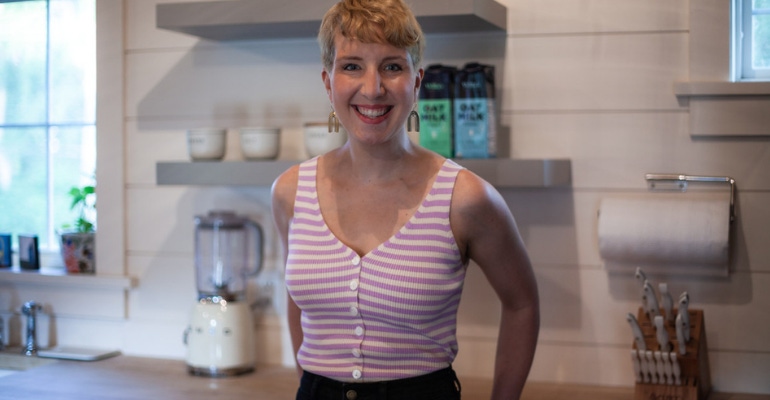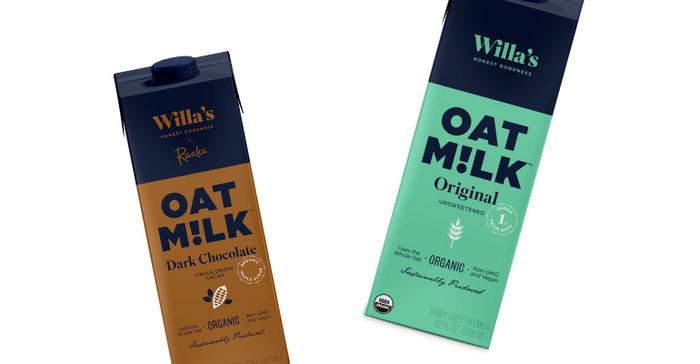Here, the co-founder of Willa's dives into omnichannel sales strategy, offers advice for burnt out entrepreneurs and talks sustainability as a core priority.
November 8, 2021

When it comes to delicious dishes grandma makes, oatmilk may not be the first thing that comes to mind. But in the case of sisters Christina Dorr Drake and Elena Dorr Zienda, oatmilk was a healthy treat their beloved grandmother Willa made for them in childhood. Little did their grandmother know she would one day inspire a brand.
“Willa was real, honest and uncompromising,” says Drake, co-founder of Willa’s. “She was also deeply passionate about food, cooking and health, and while she didn’t know oats had prebiotic fiber, she instinctively knew they were super easy on your stomach and started out by making oatmilk for her kids and grandchildren.”
Fast forward to spring 2020—and a global pandemic—when Drake and her co-founders (all family) launched the Willa’s brand. We spoke to Drake to learn more about how her grandmother’s made-with-love recipe evolved into a mission-driven, woman-owned zero waste company.
Besides Grandma Willa, what motivated you to start the brand when you did?
Christina Drake: We were disappointed by other plant-based milks’ overly sweet taste, ingredient lists that were more chemistry than kitchen and lack of real sustainable production processes, all of which inspired us to revisit our grandmother's homemade, wholesome oatmilk recipe.
What are the founders’ previous work experience? How did this experience help (or not help) in the natural products world?
CD: We all have completely different work experiences and strengths. My background is in marketing, product innovation and brand development. My sister Elena is a chemical engineer and an MBA who has spent her career trying to improve the food system from the inside out. My husband Russell’s background is in leading teams in the film industry; he is also an entrepreneur and a trainer for Dale Carnegie in sales and leadership. My mother Elena Anne's background is in elementary education, but she is also a phenomenal cook and baker—and the keeper of Willa’s recipes.
Our vastly different backgrounds have helped us identify and avoid some of the biggest pitfalls to starting a food or beverage company whether they be from a manufacturing, positioning or sales negotiation standpoint. Equally, our team's different perspectives have fostered the creativity and innovation it takes to create first-of-their-kind products.
Describe the taste of your products for someone who's never tried them.
CD: Willa’s recipes are creamy and smooth. Using the whole oat gives our recipes a richer, slightly oat-forward flavor. Willa’s is also less sweet than other plant-based milks. Our recipe has just 1 gram of sugar per cup from the oats. We balance the “oatiness” with a touch of organic vanilla extract and sea salt.
Willa’s Creamy Oat Milk is richer and uses a bit of organic, high-oleic sunflower oil. It’s a specific type of sunflower oil that is higher in omega 3s and lower in omega 6s, and has a nutritional profile similar to avocado oil. Willa’s Dark Chocolate is more indulgent and is sweetened with organic maple sugar, which, when combined with organic Raaka single origin Peruvian cacao, gives it a brownie-like quality. It is our sweetest product, but still has less than half the sugar of other chocolate milks.

Why is it important to use the whole oat?
CD: In our minds if you are going to call it oatmilk, it should use the whole entire oat and have all the benefits of the oat from a taste and nutritional standpoint. We take great pride in respecting and celebrating the integrity of the ingredients we use.
You use a special milling process that allows you use 100% of the oat, resulting in zero food waste. How important is sustainability to your brand?
CD: At Willa’s, we don’t simply aim to do no harm. Our decisions are guided by our aim to make a positive impact on people, ecosystems and the planet.
Food waste is a leading cause of greenhouse gas emissions and climate change. By creating whole food, zero waste products, we are actively fighting climate change. Equally, conventional oats are heavily sprayed with pesticides, often including glyphosate. We use organic oats—not only because we believe it is a better choice from a human health standpoint, but also because they are better for soil health.
What's it like working with retailers ranging from smaller natural food stores to behemoth web-based retailers such as Amazon, on top of managing your own e-commerce site?
CD: We planned to launch in coffee shops and coworking spaces in New York City in March 2020. When it became clear the pandemic wasn't going away anytime soon, we expanded and shifted our strategy to consumer-focused products and launching on Amazon, while still maintaining our relationships in the coffee and culinary world. Amazon is remarkable in that every step of the marketing funnel takes place within seconds. A lot can go wrong on the platform, however, which is why we are fortunate to have had partners who understand Amazon inside and out.
We love partnering with natural retailers because there are so many opportunities for us to help elevate our brand and support each other, from highlighting them on social media, to influencer outreach, to leveraging Instacart.
What advice can you offer other natural products entrepreneurs?
CD: Don’t consider self care a luxury. It is especially necessary on this path. The past two years have been extremely challenging on a personal and professional level. I was diagnosed with breast cancer at 36 years old in January of 2020, and went through chemotherapy, lumpectomy surgery and radiation while we launched Willa’s in a global pandemic.
Life felt wildly out of control, so I focused on carving out time each day for the activities that would help me get through it—and allowed me to play a role in my cancer treatment—including working out almost every day, eating foods that made me feel nourished, journaling, and therapy. And then it occurred to me: Why am I only giving myself permission to carve out time for these activities because I’m going through cancer treatment? Thankfully, I’m cancer free now, but have continued to prioritize my own needs throughout my entrepreneurial journey—because whenever I stop making time to work out or check in with myself, I see the effect it has on my ability to see the big picture. It helps me to not get bogged down in the weeds of my emails and to-do lists.
Finally, as a culture, we are shifting away from the false belief that to be a successful entrepreneur you must be willing to run on fumes every day to make it happen. Yes, it’s challenging. Yes, you’ll work long days and weekends. If anything, these facts highlight how critical it is to take care of yourself so that you can be at your best for yourself, your team and the brand you are building.
What's next for the brand?
CD: We have a very exciting product launch coming up next month. It’s a first-of-its-kind product we’ve been working on for three years!
I’m also honored and thrilled to announce that I’m participating in a panel at South by Southwest (SXSW) in March 2022. What feels especially meaningful is that we’ll be covering the critical topic of climate change, food waste and creative, new groundbreaking solutions—all through the lens of a single glass of milk.
About the Author(s)
You May Also Like




